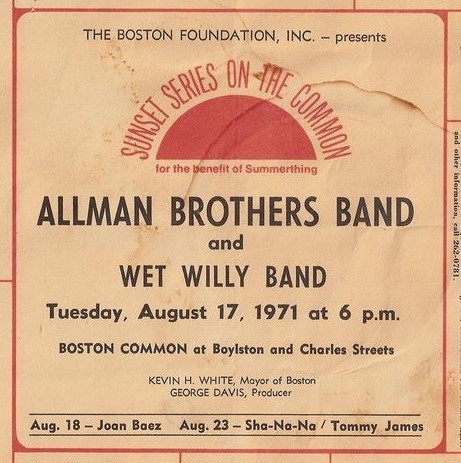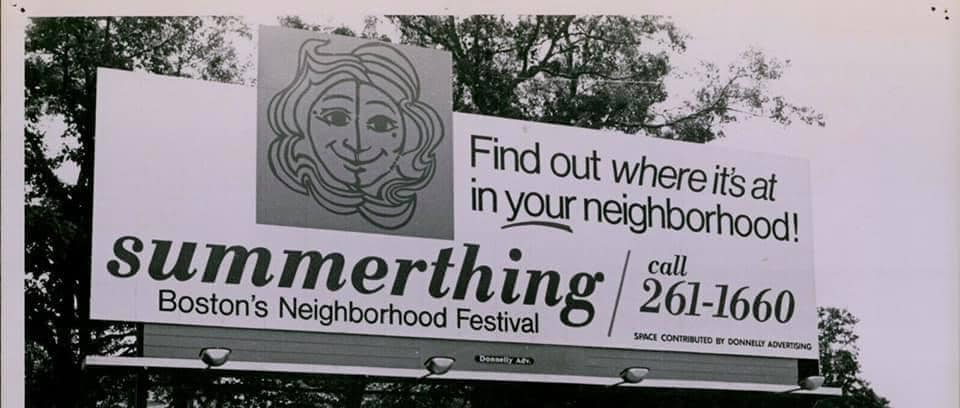By Sharon Oliver
Contributing Writer
BOSTON – America’s inner cities were rife with civil unrest during the 1960s and 1970s. In fact, it was one of the most turbulent and divisive decades in world history, scarred by political assassinations, the Vietnam War, antiwar protests, and the birth of the civil rights movement. Boston also had escalating issues with school busing and other desegregation efforts that caused even more divisions. Nevertheless, there would be a solution to help tamp down the rising tempers—at least during the summer months.
From neighborhood festival to large concerts
Founded in 1968, Summerthing expanded from a neighborhood festival to major concerts at large venues like the Boston Common, White Stadium, and Harvard Stadium. The cultural bonanza provided opportunities for creativity in individual communities. An extension of the newly elected Mayor Kevin White’s neighborhood-by-neighborhood approach to campaigning, Summerthing began with murals, plays, concerts, performances, and public art in public places.

The much-anticipated summer music and crafts festival occurred throughout Boston neighborhoods from the late 1960s until the late 1970s. Everything from cars to flatbeds and pickup trucks was used to transport equipment to set up stages in neighborhood playgrounds and fields. It was a great chance to see or participate in cultural events many could not normally afford.
A staff of nearly 2000 volunteers, coordinators, program directors, and teachers helped make Summerthing a success by providing entertainment and workshops to over half a million Boston youths in its first year. By the eighth year, there had been approximately 1,000 performances and 500 workshops. National attention drew national acts and big names drew big crowds. Opera singers appeared in the North End. There were kung fu demonstrations from Chinatown to Dorchester. Irish artists appeared in South Boston and R&B singers like Aretha Franklin, Roberta Flack, Patti LaBelle, and The Delfonics along with local musicians brought their sound to Mattapan and Roxbury.

Final Janis Joplin concert
Summerthing would also be where legendary belter Janis Joplin last performed. South End resident Kevin McElroy, who was 19 at the time, recalls being just yards away from her during a delay due to waiting on equipment. According to McElroy, Joplin was “in her own world,” drinking Southern Comfort next to the stage.
By 1970, and with the sponsorship of Schaefer Brewing Company, the festival morphed from being small concerts in neighborhoods often featuring local acts to national performers on the Boston Common or at Harvard Stadium. For $2 or $3, locals could see and dance to the music of Ike and Tina Turner, The Grateful Dead, The Supremes, The Allman Brothers Band, Jimi Hendrix, and Van Morrison even though promoters wanted to charge $10 for the counterculture experience.
Attendees reminisce
Several people wrote in a Facebook Summerthing group what they remembered or learned about those days.
Beth Jones posted:
“My mom and my grandmother went there. They used to talk about seeing Rod Stewart there.”
Don Brown added:
“Loved Summerthing…Was able to see (and meet) many of the performers like The Five Stairsteps, Brenda & The Tabulations, and knew some of the local talent like The Ambitions…Too bad there’ll NEVER be anything like it anymore…”
William Napper was a young boy at the time, always looking forward to the Summerthing coming to his area (Columbia Point in Boston near Bayside shopping mall at the time). He stated, “With all the racial tension at the time I believed it helped me focus on what I loved the most…music. I got into DJ’ing and developed a love for jazz. Imagine that as a young nine to 12-year-old boy. My mom would never let me and my siblings miss a show. Especially me; my siblings enjoyed playing with their friends in the midst of the grown-ups but I always was into the music. Still am.”
Unfortunately, the Summerthing concert series was not without its incidents or budget and bureaucracy woes, forcing it to fizzle out by the decade’s end in the seventies. However, its spirit lives on with every Boston concert and cultural celebration.
RELATED CONTENT:
Janis Joplin’s last concert was in Boston
Do you remember when Jimi Hendrix played at the Carousel Theater in Framingham?
Ruth Pointer calls Massachusetts home












